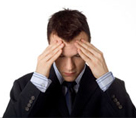
There's a guy in his fancy sports car with Tupperware around the sides is a centimetre from your bumper, flashing his lights. You’re on your hands-free unit, with one client on the line and another on hold. Then the cellphone signal drops and the phone dies. The tendons in your neck could string a Stradivarius.
Unless you’re obscenely rich or living in a tropical paradise, chances are that you feel stress – it’s simply a feature of life after the industrial revolution. We’re all familiar with the dry mouth, clammy palms (the hands, not the trees in the tropical paradise), the muscle tension.
Other symptoms
But there are many other symptoms of stress that are less well known. Here are a few, as well as tips on how to deal with them:
Duh: being forgetful and unable to concentrate or make decisions is a symptom of stress. Or maybe you just lack confidence. Take a stance and stick with it. Better still, take a ten-minute break and a cup of herb tea.
The job’s a yawn: if you’re yawning a lot and don’t feel sleepy, you could be breathing shallowly, causing your body to trigger a yawn to get the oxygen it needs. Take some deep breaths.
Blood, sweat and beers: stress was good for your ancestors, who needed the adrenaline to outrun tigers, cannibals and encyclopaedia salesmen in three-piece bearskins. Sadly, it also causes hormones called catecholamines to make your blood thicken. This is useful for outwitting the hungry neighbours, but over prolonged periods it heightens your risk of heart attack. The solution? Move to a better neighbourhood or learn to recognise and deal with stress quickly.
Sweating: another hormonal result of stress is that you sweat prolifically, especially under the arms, where the sweat is smellier than elsewhere on your body. The solution? Shower daily, use roll-on and learn to deal with stress.
Stimulant abuse: many people use stimulants such as tobacco, caffeine and particularly alcohol to cope with stress. The problem with nicotine is that it kills you. The problem with booze and caffeine is that it plays havoc with your blood sugar levels, which in turn affects your concentration and moods. The solution? Ration your consumption of caffeinated drinks – remember that many soft drinks contain lots of it. If you hope to be useful in the afternoon, avoid any alcohol at lunchtime. Drink water steadily throughout the day. Do we need to tell you to stop smoking? Of course not.
Feeling parched: the dry mouth is caused by a decrease in the flow of saliva in the mouth. It can also lead to Death Breath, or halitosis, and dental problems. Drink water, and floss and brush your teeth regularly.
Sore muscles: when you’re stressed, your muscles contract and can end up feeling strained. The back muscles are particularly prone to this, and those in the lower back can go into spasm. You can ease the muscle pain by doing some squats, resting your arms on your knees. Hold for ten seconds.
Neck strain, sore brain: if you tend to hunch over your keyboard, telephone or steering wheel, your neck muscles will tense up, which can lead to stiffness and – eventually – headaches. Up to 80 percent of headaches start this way. Try this: put your hand on your opposite shoulder, feel for tender spots with your fingertips and massage steadily. Take a long, warm bath containing oils such as arnica massage oil, or a few drops of chamomile and lavender oil.
Trouser coughs: breaking wind constantly might mean you should cut back on the chicken pies and bean soup, but it could also be a sign of stress. Wind, cramps, heartburn and diarrhoea are symptoms of irritable bowel syndrome, which can be triggered by anxiety. Cut down on caffeine, alcohol and fizzy drinks. Avoid bubble- and chewing-gum, and don’t drink anything through a straw.
Dandruff attack: prolonged stress weakens the immune system, making your scalp more vulnerable to the nasty fungi that produce dandruff (scientists examined them under powerful microscopes and found each one to be a tiny snow machine). Take care of it by always wearing white, or by taking some of the following precautions: towel-dry your hair rather than blow-drying it, which dries the skin; go easy on the anti-dandruff shampoo, which is potent and can dry the scalp, leading to more dandruff; mix some baby shampoo with your regular shampoo a few times each week; or add a few drops of lavender and tea tree oil to your shampoo, or rinse your hair in some lukewarm water containing the oils.
Jumpy legs: stress can cause an imbalance in the chemicals in your body, which makes your leg muscles jump. At night, take a couple of magnesium phosphate tissue salt tablets.
Stuffy and snotty: as we’ve said, your immune system takes a pounding when you’re badly stressed (other symptoms include outbreaks of acne, psoriasis, hives and even warts). This will make you more susceptible to colds and flu. Arguably the most powerful weapon against this is exercise of the aerobic, weight-bearing sort that lasts at least half an hour, takes place at least three times a week and makes the sweat flow freely. Apart from stimulating the immune system, this has a host of other benefits, such as helping you breathe better and sleep more deeply. Feeling rested will reduce your stress levels.
Weight gain: exercise helps to counteract this symptom of stress. The stress hormone cortisol helps flab to gather in your mid-section. While exercise has the long-term benefit of keeping you trim, it has one immediate reward: the endorphins it produces make you feel happy, and you needn’t even be an athlete with a million-buck sponsorship. It even works for joggers. – (William Smook, Health24, updated August 2010)




 Publications
Publications
 Partners
Partners












